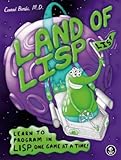The introduction is one of the funniest pieces of half-technical writing I ever read. In the rest of the book the humor is present and that is great value. I don't consider myself a Lisp expert; however, it's about a decade since my first exposure to Lisp, I have recently dig into scheme and used quite an amount of functional, logic, dynamic, high-level and whatever languages. That means that I was afraid the first chapters of the book would just be very boring to read (because I already know the contents), but perhaps a necessary evil to familiarize with the concepts and the philosophy of the book, which could prove useful when reading more advanced stuff.
Well, I was right and I was wrong. I was right since it's pretty hard resisting to read the book, even though I have some compelling things to do (or maybe more so). O was wrong because the first chapters are a pleasant reading /even if you know/ the concepts presented. Perhaps it is even more interesting as my brain is not involved into understanding difficult new concepts but can just enjoy the beautiful presentation of familiar stuff.
Besides, the book is a wonderful introduction to the functional way of thinking and covers relatively advanced topics. You can really learn Lisp from the book, even if you don't know a thing about Lisp and functional programming. However, it is nice to read for someone familiar with FP and not with Lisp. I believe that it is funny even for experienced Lisp hackers, as the comics and jokes inside the book are really funny.
Clojure is mentioned, as are Scheme and Arc. However, the focus is just Common Lisp. It is not hard to port the examples to other Lisps, however. As macros are introduced relatively late, the example could also be used with other languages, such as Python.

2 comments:
I agree, awesome book! I'm still reading it, but the jokes, the humor and the video (check out Land of Lisp on Youtube) are crazy :D
I agree. Computing is fun. Once again.
Post a Comment